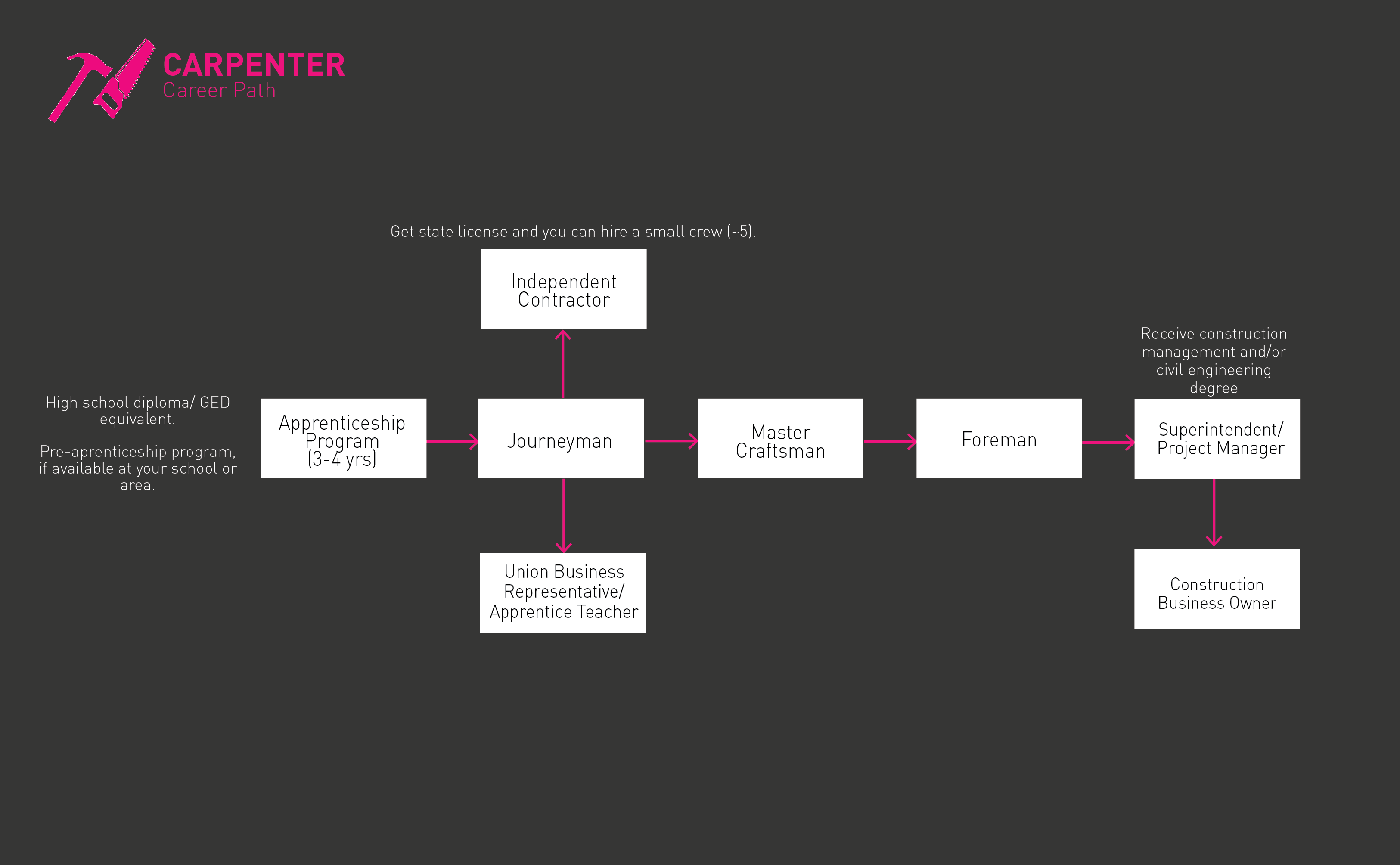Spotlights
Bridge Carpenter, Cabinet Maker, Carpenter, Concrete Carpenter, Construction Carpenter, Form Carpenter, Framer, Maintenance Carpenter, Rough Carpenter, Scaffold Builder
Carpenters build and repair building frameworks and structures made from wood and other materials.
- You get to build things and work with your hands!
- Mobility: If you are in the union, there are various local clubs across the nation. So if you move to another city, you can get on the Out of Work list and get called on for work.
- Flexibility: You decide how much you want to work. You create your own vacation. No such thing as a 2-week vacation.
“You are able to look at the world differently. You know how to do things, design things, make things…When I bought my house, I redesigned my own bathroom. You feel empowered. You can create and build on a regular basis.” Silvia Y. Ledezma, Journeyman Carpenter, Scaffold (Staging) Builder, Contra Costa County
- Follows blueprints and building plans to meet the needs of clients.
- Installs structures and fixtures, such as windows and molding.
- Measures, cuts, or shapes wood, plastic, fiberglass, drywall, and other materials.
- Constructs building frameworks, including wall studs, floor joists, and doorframes.
- Helps put up, levels, and installs building framework with the aid of large pulleys and cranes.
- Inspects and replaces damaged framework or other structures and fixtures.
- Instructs and directs laborers and other construction trade helpers.
Residential
- Works on new-home, townhome, and condominium construction and remodeling.
- Sample tasks: Builds and sets forms for footings, walls, roofs and decks; Frames interior walls, build stairs, and installs drywall, crown molding, doors and kitchen cabinets.
Commercial
- Works on commercial office building, hospitals, hotels, schools and shopping malls construction and remodeling.
- Sample tasks: Works with light gauge and load-bearing steel framing for interior partitions, exterior framing, and curtain wall construction.
- Commercial carpenters can usually perform the tasks of residential carpenters as well.
Industrial
- Works in civil and industrial settings where they put up scaffolding and build and set forms for pouring concrete. Example) tunnels, bridges, power plants, or sewer construction projects.
- Sample tasks: Builds tunnel bracing or partitions in underground passageways and mines to control the circulation of air to worksites.
- Manual dexterity: good with hands
- Phối hợp tay mắt
- Critical thinking and problem solving: will encounter unexpected problems and you will have to figure them out in a timely fashion.
- Basic math: arithmetic, algebra, geometry, calculus and statistics.
- Computer skills: project planning, estimating software.
- Chú ý đến chi tiết
- Sức mạnh thể chất và sức chịu đựng
- Can be dangerous because you are working with sharp objects and at great heights.
- No structure: you have to manage your money and time because the work is project-based. You finish a project and it might be some time when you get on another project. Need to manage your time and finances wisely.
- If you like structure and like the 2-week paycheck, then this is not the job for you. But if you want flexibility, to set your own hours, then this is a great career path.
- Building, creating and fixing things!
- Ở ngoài thiên nhiên.
“I have been artist since I was 17 years old and I have always liked working with my hands – cutting, matting.” Silvia Y. Ledezma, Journeyman Carpenter, Scaffold (Staging) Builder, Contra Costa County
- Protection: wages, discrimination, on the job injury.
- Out of work list
- Lợi ích
- Higher pay: over-time, double time.
- Retirement (depending on union): After 5 years, in some trades/unions, you are vested and are eligible for company matching. After 30 years, you are fully vested at 100 percent of your pay.
- Carpenters learn their trade through apprenticeships and practice. A high school diploma/GED is needed, but a college degree isn’t
- Some students complete an associate’s in carpentry from a community college or vocational school
- Union and contractor associations manage relevant apprenticeship programs (see our Recommended Resources > Websites for details)
- Practical education gained from work experience is vital. Entry-level carpenters start with basic tasks, learning under the supervision of a seasoned pro
- Common areas of learning include reading blueprints, basic math, building codes, safety principles, and first aid
- Đào tạo an toàn cơ bản của Cơ quan Quản lý An toàn và Sức khỏe Nghề nghiệp (OSHA) cũng cần thiết
- Additional specialized training can cover working with concrete, welding, rigging and scaffolding, and confined space protocols
- There are dozens of specialized certification options from organizations such as:
- Door and Hardware Institute
- Fenestration and Glazing Industry Alliance
- Chứng nhận Kinh doanh Xanh Inc
- Hiệp hội các nhà xây dựng quốc gia
- National Association of the Remodeling Industry
- Trung tâm Nghiên cứu và Giáo dục Xây dựng Quốc gia
- Hiệp hội sàn gỗ quốc gia
- Scaffold & Access Industry Association
- Vinyl Siding Institute
- Độ tuổi tối thiểu là 18
- High school education or equivalent
- Thể chất có thể thực hiện công việc
- U.S. citizen or proof of legal residency
- Pass substance abuse screening
Nhấp vào đây để tìm trung tâm đào tạo học việc tại địa phương của bạn.
- Take courses in high school such as shop, math, algebra, geometry, physics, and mechanical drawing
- Tập thói quen thực hành an toàn tốt và mặc thiết bị bảo hộ cá nhân đúng cách
- If needed, start an exercise program or take P.E. to ensure you have the necessary strength and stamina to perform carpentry work full-time
- Lấy bằng lái xe của bạn để bạn có thể đến các trang web việc làm khi cần thiết
- Apply to entry-level construction laborer jobs to gain real-world experience
- Volunteer with local Habitat for Humanity construction projects to learn about materials, methods, and tools. Consider overseas opportunities for extra excitement!
- Review criteria for landing a Carpenter apprenticeship in your area
- Nghiên cứu sách, bài báo và video hướng dẫn liên quan đến thương mại
- Ask a seasoned Carpenter if they can mentor you
- Keep a working draft of your resume, noting any skills you’ve picked up, projects completed, and other details
- Được chứng nhận trong một lĩnh vực chuyên biệt để củng cố thông tin đăng nhập của bạn
- 43.4% with HS Diploma
- 5.1% with Associate’s
- 6.1% với Cử nhân
- 0.9% with Master’s
- 0,3% với Chuyên nghiệp

- Carpenter apprenticeships are the way to go to get into this line of work
- Screen job ads on job portals such as Indeed, Simply Hired, Glassdoor, and Zippia, as well as Craigslist for smaller, local opportunities
- Read requirements carefully and ensure you meet all necessary criteria
- Reach out to your network to let everyone know you are looking for work
- Visit the websites of local companies that hire Carpenters. Look for job openings that may not be listed elsewhere
- Be proactive! Consider calling a few companies to ask questions about apprenticeships
- If attending a college or trade school, ask their career center for assistance putting together a resume and practicing for interviews
- Many trade/vocational programs serve as pipelines to local recruiters, so let them know when you’re ready for work!
- Review Carpenter resume templates to get ideas for wording and formats
- Attend local job fairs to talk with recruiters and share your resume
- Talk to your teachers and past supervisors about their willingness to serve as personal references
- Study Carpenter interview questions to prep for interviews!
- Hustle!: Don’t only depend on the out of work list. Attend the local union events. Make relationships with the foreman. Be proactive.
- Be able to communicate with your team.
- Be curious and constantly learn the new developments (software, techniques, news) of the career.
- Language skills: Knowing Spanish is a big plus.
Các trang web
- Apprenticeship.gov
- Các nhà xây dựng và nhà thầu liên kết
- Tổng thầu liên kết của Mỹ
- CareerOneStop
- Cục Quản lý việc làm và đào tạo lao động
- Door and Hardware Institute
- Fenestration and Glazing Industry Alliance
- Chứng nhận Kinh doanh Xanh Inc
- Mũ bảo hiểm đến Hardhats
- Viện xây dựng nhà
- Hiệp hội các nhà xây dựng quốc gia
- National Association of the Remodeling Industry
- Công đoàn Xây dựng Quốc gia
- Trung tâm Nghiên cứu và Giáo dục Xây dựng Quốc gia
- Hiệp hội sàn gỗ quốc gia
- NCCER ·
- Cục Quản lý An toàn và Sức khỏe Nghề nghiệp
- Scaffold & Access Industry Association
- United Brotherhood of Carpenters
- Vinyl Siding Institute
Sách vở
- Modern Carpentry Workbook, by Willis H. Wagner, Howard Bud Smith, et al.
- The Very Efficient Carpenter: Basic Framing for Residential Construction, by Larry Haun
- Woodworking Plans and Projects: The Step-by-Step Guide, by Anthony Deck
Nguồn cấp tin tức

Công việc nổi bật

Các khóa học và công cụ trực tuyến

Kỳ vọng về mức lương hàng năm
New workers start around $63K. Median pay is $77K per year. Highly experienced workers can earn around $82K.
Kỳ vọng về mức lương hàng năm
New workers start around $61K. Median pay is $77K per year. Highly experienced workers can earn around $100K.
Kỳ vọng về mức lương hàng năm
New workers start around $56K. Median pay is $68K per year. Highly experienced workers can earn around $83K.
Kỳ vọng về mức lương hàng năm
New workers start around $63K. Median pay is $82K per year. Highly experienced workers can earn around $105K.
Kỳ vọng về mức lương hàng năm
New workers start around $58K. Median pay is $66K per year. Highly experienced workers can earn around $80K.







